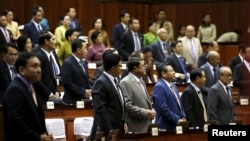Lawmakers for the opposition Cambodia National Rescue Party (CNRP) attended a plenary session at the National Assembly Wednesday, ending a parliamentary boycott that has lasted for weeks.
The boycott was a result of anti-opposition protests in November that led to the severe beatings of two opposition lawmakers outside parliament, making other lawmakers fear for their own safety and drawing widespread international criticism.
On Wednesday, 34 of 55 CNRP lawmakers, including acting president of the party, Kem Sokha, attended a full assembly session, joining the ruling Cambodian People's Party (CPP) in votes on three draft laws.
CNRP spokesman Yem Ponharith told VOA Khmer the return of his party’s lawmakers to the assembly was made possible by political agreements with the CPP during meetings last week between Interior Minister Sar Kheng and Rescue Party Vice President Kem Sokha.
Both sides agreed to maintain a “culture of dialogue,” in an effort to ease political tensions that have been roiling now for months.
CNRP's return
The CNRP aims to be involved on discussions of national issues, while exercising its rights to join Assembly debates and summon government officials for questioning, Yem Ponharith said.
“The main idea is to go back to national assembly session to fully implement the discussion between the minority voice and the majority voice," he added. "The second point is we need to check the proposed bills that are controversial. Each party has a different view," said Ponharith.
CPP spokesman Sok Eysan welcomed the return of CNRP to legislative proceedings.
“That is [absolutely the] decision of CNRP,” he said. "CPP always welcomes the participation of CNRP. When CNRP decided to boycott the assembly, that was the party's choice. But CPP believes that it would be better for the CNRP to take part in the session," said Eysan.
"However, we cannot force them to join the session," he added. "With or without CNRP, the National Assembly session won’t be stuck.”
On his Facebook page Wednesday, Prime Minister Hun Sen said the return of the lawmakers demonstrated “the ongoing progress of democracy in Cambodia, in which [members of parliament] from the ruling party and opposition work together to adopt useful laws for the nation.”
Effects of boycott
Ou Virak, head of newly formed Future Forum policy research group, said the decision to boycott was made “too fast, without thinking,” and it allowed the ruling party to put pressure on the opposition.
“I’d already foreseen that the People’s Party would put the pressure on CNRP, pressure related to their salaries and benefits, such as cars and positions on [the National Assembly’s] committees,” he said. “And because the election is coming in the next few years, they would not have the money to work on their policies or mission," said Virak.
Ou Virak and Sok Eysan both said a boycott did not effectively stop work at the assembly, where the ruling party has a large enough majority to keep it going, with or without the opposition.
This report was produced in collaboration with the VOA Khmer service.




